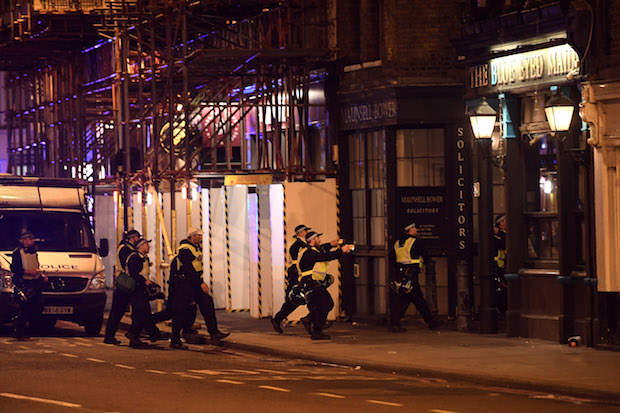For the second time in this election, political campaigning is suspended because of a terrorist attack. Given the volume of terrorist attacks—three in the last three months and five other plots disrupted—you might think that the issue would have dominated the campaign. But it hasn’t. Until Theresa May’s statement today talking about how there has been too much tolerance for extremism, there has been remarkably little discussion about how this country should deal with this problem.
Now, you can say that we shouldn’t allow the terrorists to set the agenda. But I fear that the main reason for the absence of debate is that no one is quite sure what to do. However, it is imperative that we start talking seriously about the steps we can take. This problem isn’t going away and, as the Prime Minister acknowledged this morning, it is currently getting worse.
There are those talking about internment. I think this is a flawed idea, and one that won’t work. But there are things we need to do. Ideologically we need to accept that these terrorists believe that they find justifications for their action in their faith, and saying that the attacks have nothing to do with Islam is actually counter-productive. As the historian Tom Holland has pointed out, only once we appreciate this link and the fact there is schism within Islam can we start to really deal with this threat.
Then, we need to consider whether leaving the UK for certain states that have a particular terrorist problem, for example Libya, should require an exit visa. We don’t yet know whether the London Bridge attackers have links with any other countries. But we know that the Manchester attacker went to Libya multiple times and the New York Times is reporting that he used these visits to meet with Islamic State commanders. Exit visas would make it easier for the security services to keep an eye on these kind of trips and to arrest anyone who went to these places without permission and charge them with an imprisonable criminal offence.
We also need to consider whether we need Singapore-style rules to prevent public housing from becoming racial or religious ghettoes. In diverse towns and cities, is it really sensible to have estates that are made up almost exclusively of people from one ethnic or faith group? By this logic, I wonder if we should pause before allowing faith schools to be made up solely of pupils of that faith.
We need to be having a public debate about whether we need an Islamic version of the Maynooth Grant, the money the British state sent to the Maynooth seminary in Ireland in the 19th century to create a cadre of Roman Catholic priests who were more sympathetic to the British state. A modern-day Maynooth Grant would help foster a British version of Islam, one that is more easily compatible with our society. If we go down this road, it should be accompanied by a tightening of the rules on foreign funding of religious institutions in Britain and on preachers coming here from abroad.
The answers to the terrorist problem we face aren’t simple. This isn’t about foreign policy, it is about the hatred a small—but significant—number of Islamists have for the very basis of our society. Tackling it won’t be simple. But ignoring the problem isn’t going to solve it. So, as a matter of urgency, we need to start having a grown-up–and frank–debate about what we are going to do.







Comments